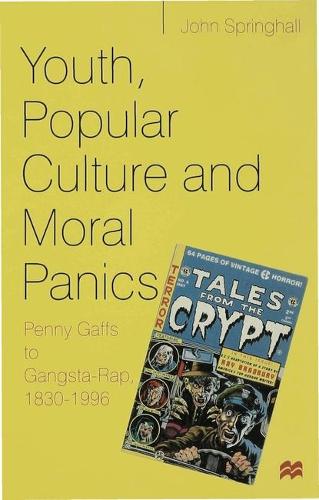
Youth, Popular Culture and Moral Panics: Penny Gaffs to Gangsta-Rap, 18301996
(Hardback)
Publishing Details
Youth, Popular Culture and Moral Panics: Penny Gaffs to Gangsta-Rap, 18301996
By (Author) John Springhall
Palgrave Macmillan
Palgrave Macmillan
28th April 1999
United Kingdom
Classifications
Tertiary Education
Non Fiction
Social and cultural history
Ethical issues and debates
306.0941
Physical Properties
Hardback
230
Width 138mm, Height 216mm
411g
Description
The international controversy (highlighted in Britain by the Bulger case) over the relationship between video nasties and crime is one that has a long prior history. Do books, films or magazines create a corrupting environment which encourages crime and moral decay Dr. Springhall has written a highly perceptive and entertaining account of how commercial culture in Britain and America has been viewed, since its inception during the Industrial Revolution, as a force likely to undermine national morals. There has been wave after wave of scares: from the Victorian penny gaff theatres and penny dreadful novels to Hollywood gangster films, and American horror comics. A final chapter refers to video nasties, violence on television, 'gansta-rap' and computer games, each in turn playing the role of folk devils which must be causing delinquency. Why particular issues suddenly galvanize public attention, and why so many people have associated delinquency with entertainment, form the fascinating subjects of this groundbreaking book.
Reviews
'Springhall's is a minutely researched, provocative and long-overdue study...the book belongs to a vital current of work concerning the neglected overlap of children's literature, print and media history, and popular culture.' - The Lion and the Unicorn 'Dr Springhall has written an excellent book, abounding with references and source lists, which is both informative and entertaining. It should be obligatory reading for anyone who thinks he/she understands the causes of juvenile crime.' - Co-operative News 'Gripped by the notion that there is something profoundly subversive about people enjoying themselves, the Anglo-Saxon middle classes, so Springhall demonstrates, have continued to indulge in regular spasms of wrath over everything from gangster films to 'gangsta rap'. The book has a particularly fascinating section on the relation between the American fear of mass culture and McCarthyism.' - Terry Eagleton, Times Higher Education Supplement '[Springhall's book]...is directed to the historical amnesia which results in wave after wave of moral panics over popular (juvenile) entertainments. This is a very welcome project, and ably accomplished by Springhall, who emerges at the close, shaking the dust of the archives from his sleeves, to conclude that such amnesia hardly equips Western societies 'to withstand the upheavals of the end of the century.' - Michael Pickering, European Journal of Communication 'Entertaining and erudite, Springhall's meticulously evidenced account demonstrates how attacks on the media help to disguise more profound social anxieties...' - Emma Longstaff, University of Cambridge, The Journal of the National Association for Youth Justice
Author Bio
JOHN SPRINGHALL is Reader in History at the University of Ulster, Coleraine.
